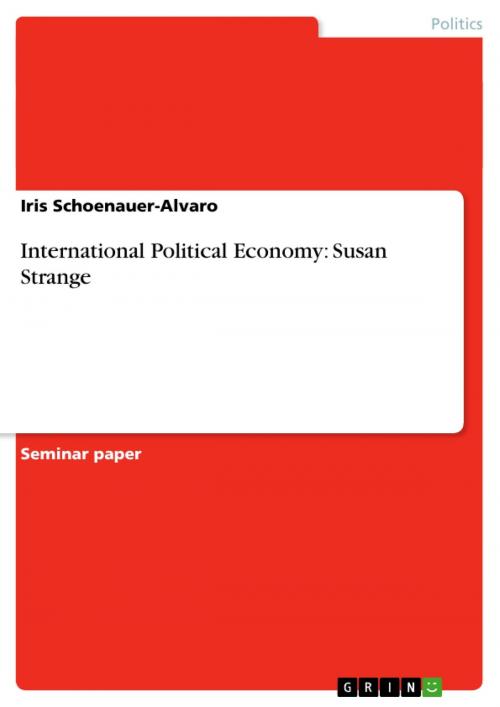International Political Economy: Susan Strange
Nonfiction, Social & Cultural Studies, Political Science, International, International Relations| Author: | Iris Schoenauer-Alvaro | ISBN: | 9783640124534 |
| Publisher: | GRIN Publishing | Publication: | July 31, 2008 |
| Imprint: | GRIN Publishing | Language: | English |
| Author: | Iris Schoenauer-Alvaro |
| ISBN: | 9783640124534 |
| Publisher: | GRIN Publishing |
| Publication: | July 31, 2008 |
| Imprint: | GRIN Publishing |
| Language: | English |
Seminar paper from the year 2002 in the subject Politics - International Politics - General and Theories, grade: Honours, Dublin City University, 16 entries in the bibliography, language: English, abstract: This essay will discuss the importance of state and non-state actors in the realms of the international political economy (IPE). In this context, I will explain whether I agree with Susan Strange's statement of 'non-state actors being now more significant than states themselves'. In order to do so, I will briefly look at Susan Strange's underlying arguments focussing, however, on power shifts in general. A succinct definition of what non-state actors are will also be included in this analysis as well as some examples which illustrate changes that have taken place in the world economy. Finally, I will give a conclusive statement as to whether I consider the state to play a less crucial role in today's globalising world. However, I can already mention at this point that I believe that the increasing interconnectedness has had a strong impact on its actors. Notwithstanding, I am convinced that the state is still a vital player whose position is merely being reorganised. Susan Strange argues in her book 'The Erosion of the State' that the state's power has been eroded for example in the following key areas: Firstly, in the finance sector, states no longer have the power to control their own currencies. Secondly, in the welfare sector, states can no longer provide welfare as the burden of additional costs in form of employers' contributions discourages multinational corporations from investing in the economy.
Seminar paper from the year 2002 in the subject Politics - International Politics - General and Theories, grade: Honours, Dublin City University, 16 entries in the bibliography, language: English, abstract: This essay will discuss the importance of state and non-state actors in the realms of the international political economy (IPE). In this context, I will explain whether I agree with Susan Strange's statement of 'non-state actors being now more significant than states themselves'. In order to do so, I will briefly look at Susan Strange's underlying arguments focussing, however, on power shifts in general. A succinct definition of what non-state actors are will also be included in this analysis as well as some examples which illustrate changes that have taken place in the world economy. Finally, I will give a conclusive statement as to whether I consider the state to play a less crucial role in today's globalising world. However, I can already mention at this point that I believe that the increasing interconnectedness has had a strong impact on its actors. Notwithstanding, I am convinced that the state is still a vital player whose position is merely being reorganised. Susan Strange argues in her book 'The Erosion of the State' that the state's power has been eroded for example in the following key areas: Firstly, in the finance sector, states no longer have the power to control their own currencies. Secondly, in the welfare sector, states can no longer provide welfare as the burden of additional costs in form of employers' contributions discourages multinational corporations from investing in the economy.















